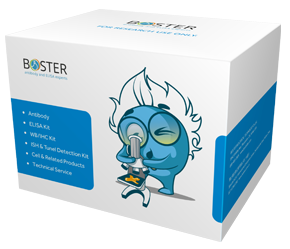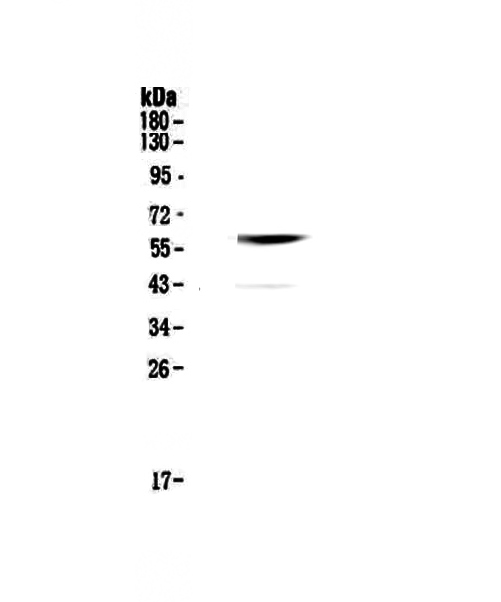Product Info Summary
| SKU: | A01291-Dyl488 |
|---|---|
| Size: | 100 μg/vial |
| Reactive Species: | Human |
| Host: | Rabbit |
| Application: | Flow Cytometry |
Customers Who Bought This Also Bought
Product info
Product Name
Anti-Human Cannabinoid Receptor I DyLight® 488 conjugated CNR1 Antibody
View all Cannabinoid R1/CB1/CNR1 Antibodies
SKU/Catalog Number
A01291-Dyl488
Size
100 μg/vial
Form
Liquid
Description
Boster Bio Anti-Human Cannabinoid Receptor I DyLight® 488 conjugated CNR1 Antibody catalog # A01291-Dyl488. Tested in Flow Cytometry applications. This antibody reacts with Human.
Storage & Handling
At -20°C for one year from date of receipt. Avoid repeated freezing and thawing. Protect from light.
Cite This Product
Anti-Human Cannabinoid Receptor I DyLight® 488 conjugated CNR1 Antibody (Boster Biological Technology, Pleasanton CA, USA, Catalog # A01291-Dyl488)
Host
Rabbit
Contents
Each vial contains 50% glycerol, 0.9% NaCl, 0.2% Na2HPO4, 0.02% NaN3.
Clonality
Polyclonal
Isotype
Rabbit IgG
Immunogen
E. coli-derived human Cannabinoid Receptor I recombinant protein (Position: M1-Q75).
*Blocking peptide can be purchased. Costs vary based on immunogen length. Contact us for pricing.
Cross-reactivity
No cross-reactivity with other proteins.
Reactive Species
A01291-Dyl488 is reactive to CNR1 in Human
Reconstitution
Observed Molecular Weight
39 kDa
Calculated molecular weight
52.858kDa
Background of Cannabinoid R1/CB1/CNR1
The cannabinoid receptor type 1, often abbreviated as CB1, is a G protein-coupled cannabinoid receptor located primarily in the central and peripheral nervous system. This gene encodes one of two cannabinoid receptors. The cannabinoids, principally delta-9-tetrahydrocannabinol and synthetic analogs, are psychoactive ingredients of marijuana. The cannabinoid receptors are members of the guanine-nucleotide-binding protein (G-protein) coupled receptor family, which inhibit adenylate cyclase activity in a dose-dependent, stereoselective and pertussis toxin-sensitive manner. The two receptors have been found to be involved in the cannabinoid-induced CNS effects (including alterations in mood and cognition) experienced by users of marijuana. Multiple transcript variants encoding two different protein isoforms have been described for this gene.
Antibody Validation
Boster validates all antibodies on WB, IHC, ICC, Immunofluorescence, and ELISA with known positive control and negative samples to ensure specificity and high affinity, including thorough antibody incubations.
Application & Images
Applications
A01291-Dyl488 is guaranteed for Flow Cytometry Boster Guarantee
Assay Dilutions Recommendation
The recommendations below provide a starting point for assay optimization. The actual working concentration varies and should be decided by the user.
Flow Cytometry (Fixed), 1-3μg/1x106 cells
Validation Images & Assay Conditions

Click image to see more details
Boster Kit Box
Protein Target Info & Infographic
Gene/Protein Information For CNR1 (Source: Uniprot.org, NCBI)
Gene Name
CNR1
Full Name
Cannabinoid receptor 1
Weight
52.858kDa
Superfamily
G-protein coupled receptor 1 family
Alternative Names
Cannabinoid receptor 1; CB-R; CB1; CANN6; CNR1; CNR; CNR1 CANN6, CB-R, CB1, CB1A, CB1K5, CB1R, CNR cannabinoid receptor 1 cannabinoid receptor 1|cannabinoid receptor 1 (brain)|central cannabinoid receptor
*If product is indicated to react with multiple species, protein info is based on the gene entry specified above in "Species".For more info on CNR1, check out the CNR1 Infographic

We have 30,000+ of these available, one for each gene! Check them out.
In this infographic, you will see the following information for CNR1: database IDs, superfamily, protein function, synonyms, molecular weight, chromosomal locations, tissues of expression, subcellular locations, post-translational modifications, and related diseases, research areas & pathways. If you want to see more information included, or would like to contribute to it and be acknowledged, please contact [email protected].
Specific Publications For Anti-Human Cannabinoid Receptor I DyLight® 488 conjugated CNR1 Antibody (A01291-Dyl488)
Hello CJ!
No publications found for A01291-Dyl488
*Do you have publications using this product? Share with us and receive a reward. Ask us for more details.
Recommended Resources
Here are featured tools and databases that you might find useful.
- Boster's Pathways Library
- Protein Databases
- Bioscience Research Protocol Resources
- Data Processing & Analysis Software
- Photo Editing Software
- Scientific Literature Resources
- Research Paper Management Tools
- Molecular Biology Software
- Primer Design Tools
- Bioinformatics Tools
- Phylogenetic Tree Analysis
Customer Reviews
Have you used Anti-Human Cannabinoid Receptor I DyLight® 488 conjugated CNR1 Antibody?
Submit a review and receive an Amazon gift card.
- $30 for a review with an image
0 Reviews For Anti-Human Cannabinoid Receptor I DyLight® 488 conjugated CNR1 Antibody
Customer Q&As
Have a question?
Find answers in Q&As, reviews.
Can't find your answer?
Submit your question
6 Customer Q&As for Anti-Human Cannabinoid Receptor I DyLight® 488 conjugated CNR1 Antibody
Question
Is this A01291-Dyl488 anti-Human Cannabinoid Receptor I DyLight® 488 conjugated antibody reactive to the isotypes of CNR1?
Verified Customer
Verified customer
Asked: 2020-02-27
Answer
The immunogen of A01291-Dyl488 anti-Human Cannabinoid Receptor I DyLight® 488 conjugated antibody is E. coli-derived human Cannabinoid Receptor I recombinant protein (Position: M1-Q75). Could you tell me which isotype you are interested in so I can help see if the immunogen is part of this isotype?
Boster Scientific Support
Answered: 2020-02-27
Question
I was wanting to use your anti-Human Cannabinoid Receptor I DyLight® 488 conjugated antibody for Flow Cytometry for human fetal brain on frozen tissues, but I want to know if it has been validated for this particular application. Has this antibody been validated and is this antibody a good choice for human fetal brain identification?
Verified Customer
Verified customer
Asked: 2019-09-26
Answer
You can see on the product datasheet, A01291-Dyl488 anti-Human Cannabinoid Receptor I DyLight® 488 conjugated antibody has been tested for Flow Cytometry on human tissues. We have an innovator award program that if you test this antibody and show it works in human fetal brain in IHC-frozen, you can get your next antibody for free.
Boster Scientific Support
Answered: 2019-09-26
Question
We were content with the WB result of your anti-Human Cannabinoid Receptor I DyLight® 488 conjugated antibody. However we have been able to see positive staining in fetal brain cell membrane using this antibody. Is that expected? Could you tell me where is CNR1 supposed to be expressed?
Verified Customer
Verified customer
Asked: 2019-06-03
Answer
According to literature, fetal brain does express CNR1. Generally CNR1 expresses in cell membrane. Regarding which tissues have CNR1 expression, here are a few articles citing expression in various tissues:
Brain, Pubmed ID: 17895407
Brain stem, Pubmed ID: 1718258, 2263478
Fetal brain, Pubmed ID: 15620723
Hippocampus, Pubmed ID: 14702039
Lung, Pubmed ID: 7876112, 15489334
Boster Scientific Support
Answered: 2019-06-03
Question
We are currently using anti-Human Cannabinoid Receptor I DyLight® 488 conjugated antibody A01291-Dyl488 for human tissue, and we are satisfied with the Flow Cytometry results. The species of reactivity given in the datasheet says human. Is it possible that the antibody can work on monkey tissues as well?
Verified Customer
Verified customer
Asked: 2018-03-23
Answer
The anti-Human Cannabinoid Receptor I DyLight® 488 conjugated antibody (A01291-Dyl488) has not been tested for cross reactivity specifically with monkey tissues, but there is a good chance of cross reactivity. We have an innovator award program that if you test this antibody and show it works in monkey you can get your next antibody for free. Please contact me if I can help you with anything.
Boster Scientific Support
Answered: 2018-03-23
Question
Our lab want to know about to test anti-Human Cannabinoid Receptor I DyLight® 488 conjugated antibody A01291-Dyl488 on human fetal brain for research purposes, then I may be interested in using anti-Human Cannabinoid Receptor I DyLight® 488 conjugated antibody A01291-Dyl488 for diagnostic purposes as well. Is the antibody suitable for diagnostic purposes?
J. Wu
Verified customer
Asked: 2015-12-03
Answer
The products we sell, including anti-Human Cannabinoid Receptor I DyLight® 488 conjugated antibody A01291-Dyl488, are only intended for research use. They would not be suitable for use in diagnostic work. If you have the means to develop a product into diagnostic use, and are interested in collaborating with us and develop our product into an IVD product, please contact us for more discussions.
Boster Scientific Support
Answered: 2015-12-03
Question
We have observed staining in human fetal brain. Do you have any suggestions? Is anti-Human Cannabinoid Receptor I DyLight® 488 conjugated antibody supposed to stain fetal brain positively?
A. Anderson
Verified customer
Asked: 2015-07-10
Answer
From literature fetal brain does express CNR1. From Uniprot.org, CNR1 is expressed in caudate nucleus, brain stem, lung, fetal brain, hippocampus, brain tumor, brain, among other tissues. Regarding which tissues have CNR1 expression, here are a few articles citing expression in various tissues:
Brain, Pubmed ID: 17895407
Brain stem, Pubmed ID: 1718258, 2263478
Fetal brain, Pubmed ID: 15620723
Hippocampus, Pubmed ID: 14702039
Lung, Pubmed ID: 7876112, 15489334
Boster Scientific Support
Answered: 2015-07-10




